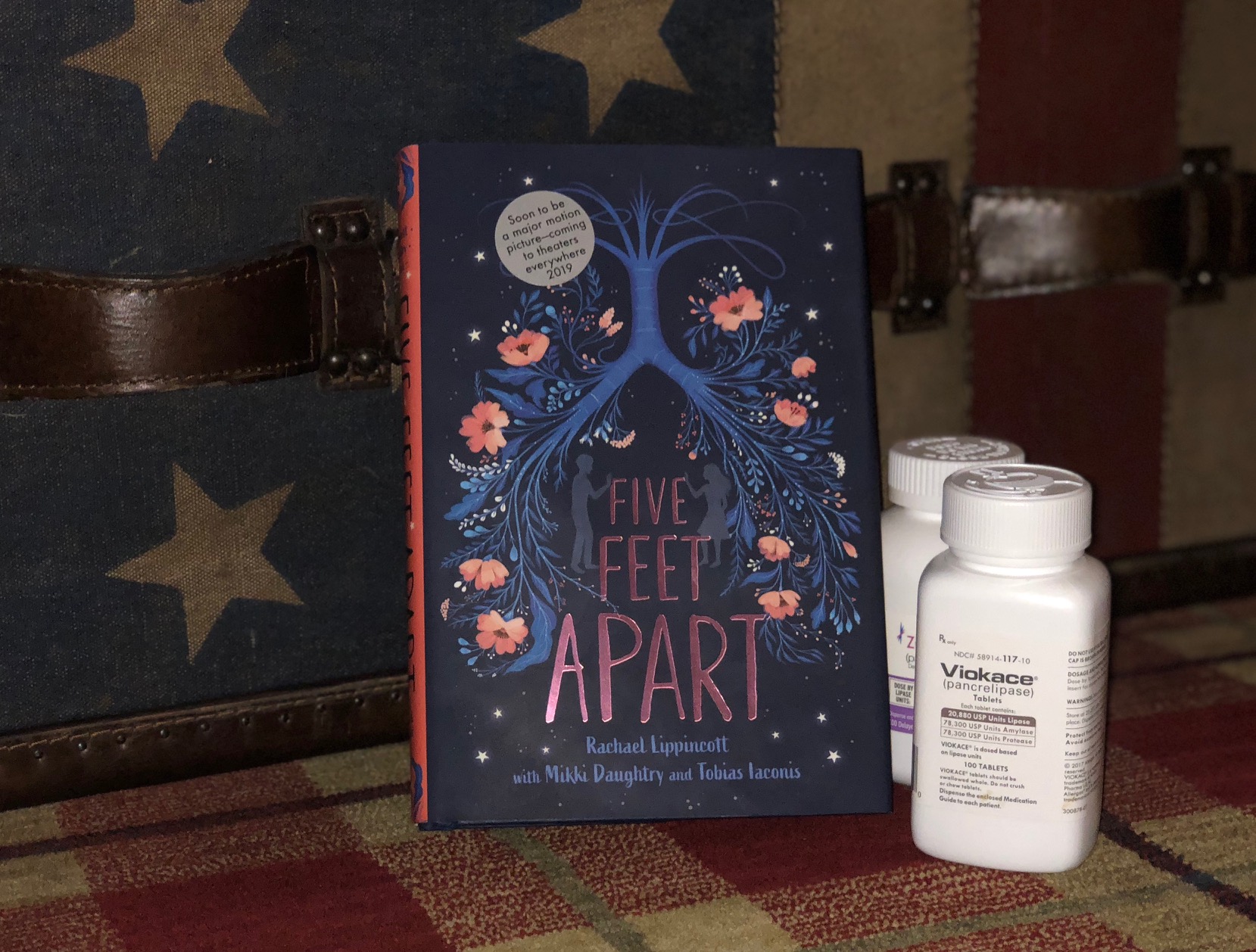If you listened to the podcast last week, you’d know I read Five Feet Apart about a month ago. Believe it or not, there were points of the story that I did appreciate, but on the whole, it read like a hastily written novelization of a screenplay with weak characters. Allow me, for a moment, to put my creative writing hat on, after all that is what I studied in college. For the sake of giving an honest review, I’ll talk about some of the things I liked and others I didn’t.
Spoilers ahead, so if you don’t want to hear about it, stop reading now.
The true antagonist of the story is the contact precaution placed upon Stella and Will. There’s no way around it, the story makes a villain out of the very thing designed to keep our two heroes safe. Aside from the real world implications of such a fact, the story could have been much stronger had they really gotten to the root of the problem (or not used it at all), and I think unfortunately our writers fall short because of their grade school level understanding of CF. I’ll dissect the problem for you…
Stella and Will can’t be together because there is no way to harness the infectious disease problem in cystic fibrosis. Yes, Will participates in a drug trial in an attempt to get ahold of his B. cepacia infection, but the talk of infectious disease sort of ends there. Not once are the larger implications of his trial’s desired success discussed. In a perfect world, Stella and Will wouldn’t deal with drug resistant infections, and thus they’d be able to be together. I felt like we were let down, which is the irony of the story, because that’s where the true conflict lies. It’s the invisible barrier the characters are well aware of, but seem not to care about. I will say that everyone is super anal about cross-infection, but problem is quickly ignored when Stella actually goes into Will’s hospital room and their tandem swim in the hospital’s pool. If Stella and Will were in the pursuit of getting healthier (put another way, if we cared about the success of his drug trial), the problems they encounter in the story wouldn’t manifest, yet the grander idea of health is never touched. Is it because the characters are complacent with their health? It felt like they had little desire to get better.
I think had a person with CF been writing about the same topic, the issue could have been heavier, and more eloquently articulated. It’s already a break from reality, which is okay, but creative license around the issue feels forced, and quite frankly, offensive.
Poe was the one character I was able to relate to. He was more than a patient. He had an interesting and developed back-story, who happened to be in the hospital at the same time as Stella and Will. He had a humorous side to him, something I think a lot of people with CF can relate to – it is an effective coping mechanism – but he also dealt with the horrendous burden of the disease, and he was doing it alone. CF is a lonely illness and it felt like Poe’s overly exaggerated situation – his parents were deported – was designed to hammer that home, a place where the creative license actually worked. I almost wish the story was about him. He was level headed, he commanded his care routine and he was the typical empowered patient. He didn’t take any shit from the care providers, and he was more than willing to speak up for himself. When he suddenly passed away, though, I felt like the wrong character died.
My biggest bone of contention was the overall message of the story surrounding death. The two patients who engaged in the kind of activity that can kill people with cystic fibrosis didn’t die. Of course there are people living with CF who engage in this kind of behavior and are totally fine. Sadly, though, we know many people who attended CF camps, and the like are no longer with us.
Not to mention, Stella and Will were seemingly consumed with the idea of dying – where in the beginning of the story, Stella sets aside some time to contemplate the afterlife, and then the two of them later have a conversation about it. The foreshadowing mechanisms were in place, but they were left empty in the end of the story. On one hand I sort of understand where the constant thought of death was coming from. I mean even when people suffer from the common cold, our minds race to the idea of human vulnerability, but in the grand scheme of things, it felt like the characters were racing towards death without the desire to get better. Will was seemingly in a trial against his own will, and Stella accepted her own barreling path towards transplant. Even when Will did come around to taking better care of himself, he wasn’t doing it in an effort to get better.
I think this is where the story fails, or at the very least, falls short. If felt like the writers were scared of killing off a main character, or also showing that people with CF can, in fact, get better. Stella and Will were stuck in the middle. I think that’s lazy writing.
I point to my own experience with CF, I was quickly headed to end-stage 5 or 6 years ago, but I just blew my best PFT since 2011ish because of my desire to get better, command my care and work with my providers and support system.
Our characters are consumed with dying, to the point where they are willing to kind of overlook the contact precautions (let’s steal that one foot back!) and they talk about how life shortening the disease should be (which I personally don’t agree with, but I digress), but they both live happily ever after. It just felt wrong. When these kinds of things happen in real life, the ending is often very different. This, right here, is another gross misrepresentation.
A lot of people are talking about accuracy this, or inaccuracy that, and quite frankly I’ve never cared about the technical stuff, but their survival is a major plot point, and in the end of the story, it felt fake. It was a disingenuous end to an otherwise lazy story. Maybe it was because the target audience was YA readers? I have no idea.
Aside from major plot points, the story undoubtedly romanticized cystic fibrosis, “He’s so cute it feels like my lung function dropped another 10%,” and, of course, Will giving Stella rescue breaths in the end of the story… I have no time for that.
The characters were mostly weak. It felt like they were trying to pull pity from the readers. Aside, from Stella using her illness expertise to build her app (which I LOVED by the way… I’m happy to give credit where it’s deserved), our characters embodied the victim mentality:
“But I don’t want any of my bad juju anywhere near that healthy baby.”
“My lungs are toast, so I’m going to enjoy the view while I can.”
“As CFers, so much is taken away from us. We live every single day according to treatments, pills.”
There’s really no denying it. The constant complaining bothered me. They allowed the ebb and flow of hospital life to consume them, to the point where it was nearly lost on me that they were dealing with cystic fibrosis. Most people I know with CF have the ultimate goal of getting out of the hospital and returning to real life as quickly as possible. Stella and Will, however, were at the mercy of the hospital system, with constant scolding from the providers and recurring chats about living with a time limit placed upon them. When I am placed in an inpatient setting, I absorb the information around me, and then set goals. My goals are always the same, get better and learn from what circumstances that led me to get sick. I think my go-getter personality is what got in the way of relating to Stella and Will.
Ultimately I found Stella and Will consumed in negativity around the condition, and I choose not to live my life through such a negative lens.
In the end, I think Five Feet Apart is (YES…. I SAID IT… IS) worth talking about. I think it gives a grade school level look at cystic fibrosis, and it did come across that the writers tried… well, they gave it a shot at least… to understand cystic fibrosis. They were talking about cystic fibrosis, but I did not see my experience in the pages. People living with cystic fibrosis command their lives with grace, integrity and poise… Stella and Will didn’t have that. They were portrayed as two teenage lovers willing to give it all up… for what? Nothing… because nothing happened. The story just wasn’t at all interesting. It exploited and stereotyped the CF experience without any kind of meaning. Some folks may see their story in the pages, albeit through a different lens, and if that’s the case, it’s important to understand why they feel that way, too!
If someone wants to write an interesting story about CF, and make it into a movie, give me a call. I’d be happy to put you in touch with any one of my friends with CF… because their lives are a hell of a lot more interesting than this story was. Talk to them about their lives with CF, and learn from them.
Let’s go through some questions…
Do I think you should avoid reading the book or seeing the movie?
No… I think you should absolutely dive in. Love it or hate it, it is what it is. That being said, I think it’s important for people living with CF to have the ability to control their own narrative. Sadly Five Feet Apart is going to be a driving force of the narrative of CF for a few months before it’s long forgotten, so if you want to get out ahead of it, you need to read the book or see the movie to decide how you feel about it. At the end of the day, though, am I concerned about what 25,000 teenagers think about cystic fibrosis? No… I could care less, quite frankly. My issue with the popular portrayal of CF, is we’re seeing two kids who can’t relate to anyone but people living with the illness, and since folks love to over emphasize thing, that is what will hold true of the disease as far as larger representation is concerned.
Did the technical inaccuracies bother me?
I have said this from the start, so let me make this very clear, the technical stuff has never been any of my concern, and if you’re attributing any other words to me, you’re wrong. The larger plot points, character development and overall portrayal of the cystic fibrosis experience, basically what I talked about above, are my points of disagreement (and also agreement, like in the case of Poe). I laughed when the characters started sticking their pills in pudding, strapping on the AffloVest (by the way, people actually use that thing?!?), or having free reign of a hospital complex. Those inaccuracies allow the story to progress… they’re fine with me, albeit fun to laugh at.
Is it worrisome that it’s a for-profit venture?
I’ve also said this from the beginning… I’m happy they’re making money in exchange for their blood, sweat and tears required to make such a project! They have NO moral obligation to put any funding towards cystic fibrosis. CF is the vehicle for the story, that’s about it. Lest we forget, our financial situation in CF is quite good. CFF is sitting on top of one of the most well endowed clinical drug development pipelines in the history of medicine. I think we’ll be just fine if the moviemakers and writers take their cut off the top.
What about people who are excited to read the book or see the movie?
Opinions are like assholes, everyone has one. My opinion isn’t correct, and neither is yours. If you feel like this an amazing opportunity for the cystic fibrosis community, then I am unbelievably happy for you. I am excited that when you read the book, or eventually see the movie, you see yourself in the pages or on the big screen. You should not be denied that feeling. What I do want you to know, though, is that there are people who are NOT happy with this project, and it would do you an injustice to invalidate the way they feel about it. The divide this project has caused is troublesome, but to that I will say this…. just because you and I may not agree on this singular topic, doesn’t mean we don’t have the same end goal, a life where we all have our hands on a livable cure for cystic fibrosis.
Will I see the movie?
Yes, I will. The bottom line is we are settling with a YA representation of cystic fibrosis in the limelight. I am not the kind of person to entrust Hollywood, celebrities and pop culture with anything. That being said, it’s not against the law to write this story. It’s a teen romance that will go away as soon as the next one comes out. Our 5 minutes of fame will be exactly that, 5 minutes.





